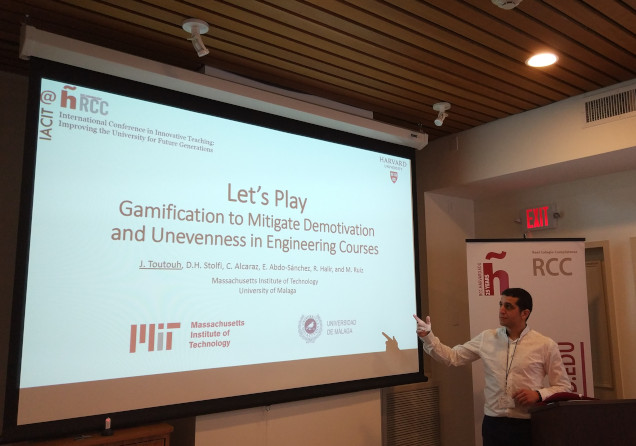
We were able to present our project about using gamification in engineering lectures
Presenting our work about innovative teaching at Harvard
Our work about applying Gamification in our lectures to motivate our Engineering students was accepted to be presented during the International Annual Conference in Innovative Teaching: Renovating the University for Future Generations (IACIT@RCC) [ACIT@RCC], which took place at RCC–Harvard on May 16-17, 2019.
The main idea behind our presentation was to share our experience when teaching Engineering degrees, in which we apply gamification to address two main issues: the students lack of motivation and the large differences in the students back-ground and skills Download the presentation.
Abstract of our work
Lecturers have to face two main difficulties when teaching Engineering degrees: the students lack of motivation and the large differences in the students back-ground and skills. An innovative teaching project (PIE17-122) funded by the University of Malaga proposes the use of gamification as a way to mitigate such issues by converting the learning process into a funny experience.
Its main objectives are:
- increasing the students motivation by promoting healthy competition,
- improving cooperation and interpersonal relationships while seekinga balance among the groups,
- fostering the loyalty of the students to the subject.
The methodology applied consists of three phases: preparation, execution, and monitoring. During preparation, we design knowledge tests, games, and surveys. The execution phase consists in performing the games and surveys. The monitoring phase includes several procedures to asses the evolution of students cognitive skills, their level of motivation, and the degree of learning. The tasks performed during the monitoring phase and the feedback of the students allow the lecturers to better adapt the games and the content of the lessons to the reale volution of the students.
The main conclusions are:
- an improvement in the students engagement,
- the students prefer games that involve ICT platforms (such as, Kahoot or Socrative),
- the competitiveness among groups increases when the games have any kind of prize,
- and applying gamification is not as simple as introducing games in the courses, since a bad design of the games can lead to a loss of interest.
Jamal Toutouh PUBLICATIONS
publication innovative teaching jamal gamification